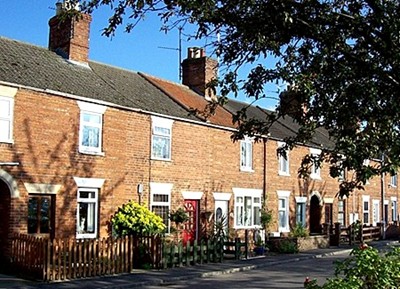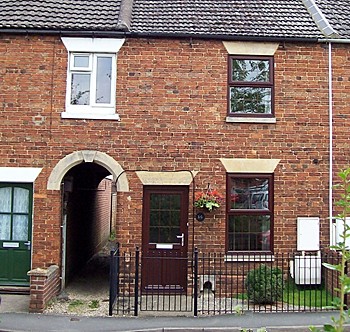|
Murder in Hereward Street JEALOUS SOLDIER SHOOTS
WIFE
Among the casualties of war are broken marriages because enlistment means that husbands are away from home for long periods, sometimes years, and the strain on personal relationships proves to be too much for too many. The problem has always been with us and was no more evident than during the Second World War of 1939-45 when almost six million men from Britain joined the forces, many of them leaving wives and girlfriends back home to cope as they could. It was inevitable that some found new relationships and the “Dear John” letters became a familiar part of service life as soldiers, sailors and airmen away from home received the bad news that the woman in their life had found someone else. This was the situation that led to a tragedy that shocked Bourne in the early years of the war when a young army wife was murdered by her jealous husband who then took his own life. Ernest and Amy Earnshaw, both aged 21, had only been married for a few months but the strain of separation was beginning to tell. She was lodging at No 14 Hereward Street, a small terraced house close to the town centre. He was serving as a driver with the Royal Army Service Corps in the north of England and his problems surfaced after receiving a letter from his wife asking for a divorce. He went to see his commanding officer who granted him special leave and on return he said that the trouble between them had been settled. A few weeks later, he returned home on leave again and this time his stay ended in tragedy. Hearing two shots from their bedroom early on the morning of Wednesday 9th July 1941, landlady Mrs Annie Darnes called her neighbour, Mrs Mabel Collins, who then went upstairs and found the body of Ernest Earnshaw slumped behind the door and his wife lying in bed, still in her nightdress. Both were dead, having been shot with a service rifle that lay nearby. The sad story of domestic unhappiness that led up to the double shooting tragedy slowly unfolded during an inquest before the South Kesteven coroner, Mr Geoffrey Phillips, held at the Town Hall the following day as evidence was given by Mrs Darnes and her neighbours, the police and a local doctor. It transpired that after his compassionate leave, Earnshaw, whose home was at Newton-le-Willows, Lancashire, had returned to his wife’s lodgings to find that she had gone to stay with her brother in Skegness and he then, with tears in his eyes, confided to Mrs Darnes: “She is breaking my heart. I don’t know what I am going to do. Her own people always come before me.” Mrs Earnshaw came back from Skegness two days afterwards when she told Mrs Darnes: “My husband is a very jealous man and he is going on at me for staying with my brother who he says is a fast man.” The couple continued quarrelling, about money and her wish to join one of the women’s services which her husband was against, and about a letter that had been written to her by a man who once worked with her which particularly enraged Earnshaw so much that he left the house in an angry mood. The following day, he went with his wife to collect her suitcase from the railway station and then left the house again. While he was away, Mrs Earnshaw told Mrs Darnes: “I have had a hell of a life and I would not have got married if I had known.” Mrs Darnes said that the bickering between the two continued for much of the day and Earnshaw asked if he could stay the night but added: “I must be up at 5.30 am.” They then went to bed but continued talking for some time and Earnshaw went up and down stairs several times. Then at about 7.10 am the following day, she heard Earnshaw come upstairs. “I got out of bed and went downstairs”, she said. “I stood at the foot of the stairs and heard a gun go off. I then heard a click and another shot and then a thud. I rushed down the passage and saw my neighbour, Mrs Collins [of No 8 Hereward Street], who asked what was going on and I asked her to come and look. ‘I think it is that soldier’, I said. She went upstairs and when she came down said: ‘They are both dead.’” Mrs Darnes then told the coroner of an earlier conversation with the couple when they were discussing that the number of murders in the country appeared to have fallen since the war had started and Earnshaw remarked: “Only soldiers shooting their wives over other men.”
Another neighbour who also gave evidence was Mrs Hester Leverington, who lived next door at No 16 Hereward Street. She said that at about 7.10 am on Wednesday she saw Earnshaw go along the passage between her house and that of Mrs Darnes. “He was carrying a rifle”, she said. “I remarked that he had got up early and he replied that he was up at a quarter past five. Then, after he had gone into the house, I heard two distinct bangs.” Medical evidence was given by Dr George Holloway, a local general practitioner, who told the hearing that Earnshaw was lying on his back just inside the door of his wife’s room with his head inclined to the right and resting against the wall. He had a hole in the back of his head and near his right side was his army rifle. Mrs Earnshaw was lying on her back on the left side of the bed with her head inclined to the left. There was a large hole in her forehead which was almost destroyed. On the right side of the bed was an empty cartridge case. Both were dead from the result of gunshot wounds, self-inflicted in the case of Earnshaw. Police Constable Broughton said in evidence that there was a spent cartridge case in the rifle and a live cartridge in the magazine. Mrs Earnshaw was in her nightdress and there was no doubt that she was killed as she lay in bed. The jury found that Mrs Earnshaw was murdered by her husband and that he then committed suicide while his mind was disturbed by a strong fit of jealousy.
Go to: Main Index Villages Index |

